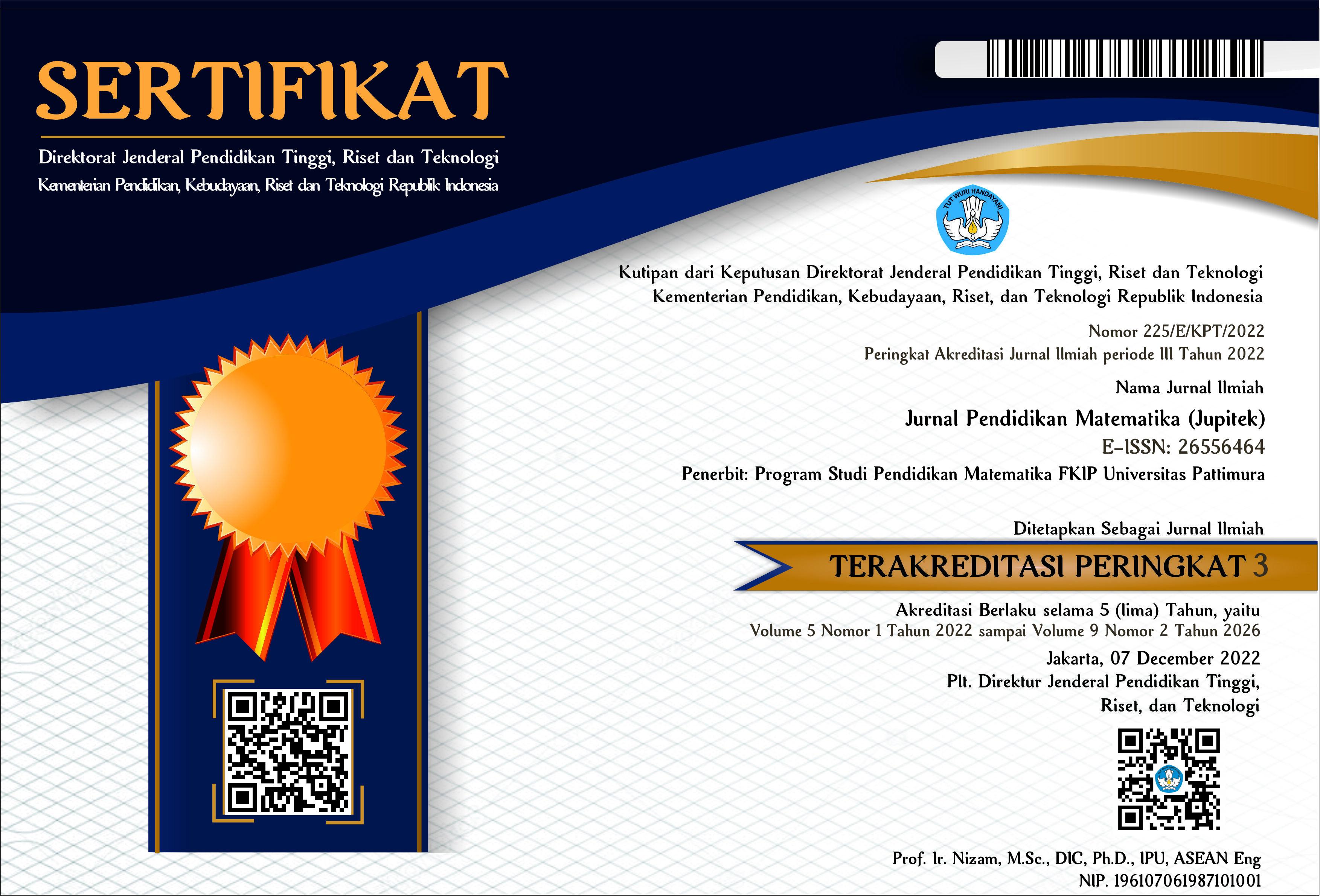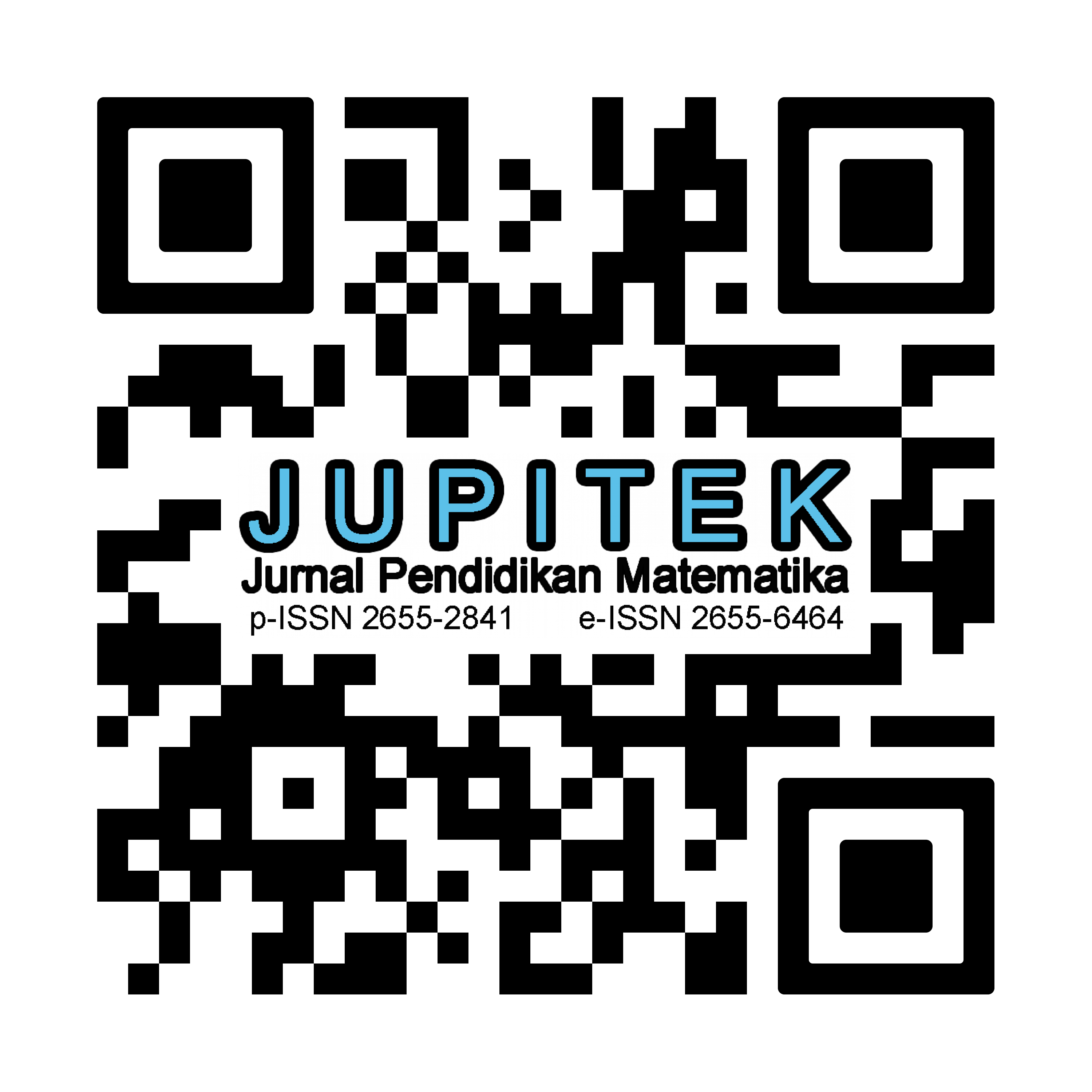PENGARUH KECERDASAN EMOSIONAL, DAN SELF EFFICACY TERHADAP KINERJA GURU MATEMATIKA
Abstract
The research was purpose to understand the relationship between emotional intelligence self-efficacy and job performance math teacher. The method was conducted by survey research. The research sample were 80 teachers of teachers on the junior high schools as Kota Bengkulu. The sample was selected by simple random sampling. The data was collected through a Likert scale questionnaire technique. The statistical analysis for the data, we were applied path analysis. The results of this study were 1) there is direct effect of emotional intelligence towards job performance math teacher, 2) there is direct effect of self-efficacy towards job performance math teacher, 3) there is direct effect of emotional Intelligence towards self-efficacy.
Downloads
References
Abdolvahabi, Z., Bagheri, S., & Kioumarsi, F. (2012). Relationship between Emotional Intelligence and Self-efficacy in Research among Tehran Physical Education Teachers Department of Physical Education and Sport Science , Shahr-e-Gods Branch , Islamic Azad. European Journal of Experimental Biology, 2(5), 1778–1784.
Afifi, M. (2016). Emotional Intelligence , Self- Efficacy and Academic Performance among University Students. IOSR Journal of Nursing and Health Science (IOSR-JNHS), 5(3), 74–81. https://doi.org/10.9790/1959-0503027481
Hashemi, S. A., Kimiaie, A., & Hashemizadeh, S. M. (2014). Title : The relationship between emotional intelligence and self-efficacy and academic performance of students. World Essays Journal, 1(2), 65–70.
Herawaty, D. (2015a). Hubungan Kecerdasan Emosional Dengan Partisipasi Guru Matematika Dalam Forum Ilmiah. Jurnal Math Educator Nusantara, 1(1), 21–28.
Herawaty, D. (2015b). Profil Kompetensi Guru Matematika Jenjang SMP di Kota Bengkulu. Jurnal Penelitian Pendidikan Matematika Dan Sains, 22(1), 77–83.
Herawaty, D. (2016). Pengaruh Kecerdasan Emosional, Partisipasi Guru dalam Forum Ilmiah, Self efficacy, dan Motivasi Kerja terhadap Kinerja Guru Matematika. Jurnal Review Pembelajaran Matematika (JRPM), 1(1), 71–85. Retrieved from http://jrpm.uinsby.ac.id
Ream, K. S. (2010). The Relationship of Emotional Intelligence and Self-Efficacy of First and Second Year Principals. Dissertation at the University of Missouri-Columbia, (December).
Supriyanto, A., & Troena, E. (2012). Pengaruh Kecerdasan Emosional dan Kecerdasan Spiritual terhadap Kepemimpinan Transformasional, Kepuasan Kerja dan Kinerja Manajer (Studi di Bank Syariah Kota Malang). Jurnal Aplikasi Manajemen, 10(4), 693–709. Retrieved from http://jurnaljam.ub.ac.id/index.php/jam/article/viewFile/455/493
Susi Hendriani, Yulia Efni, R. (2013). Kecerdasan emosional, komunikasi, komitmen, dan kinerja pegawai. Jurnal Ilmu Komunikasi, 2(3), 57–66.
Wibowo, C. T. (2015). Analisis pengaruh kecerdasan emosional (EQ) dan kecerdasan spiritual (SQ) terhadap kinerja karyawan. Jurnal Bisnis Dan Manajemen, 15(1), 1–16.
Copyright (c) 2019 Susnaini Julita, Dewi Herawaty, Sandra Alfi Gusri

This work is licensed under a Creative Commons Attribution-NonCommercial-ShareAlike 4.0 International License.
License and Copyright Agreement
By submitting a manuscript to Jurnal Pendidikan Matematika (JUPITEK), the author(s) certify and agree to the following terms:
- Originality and Authority: The submitting author is authorized by all co-authors to enter into this agreement. The manuscript describes original work that has not been published previously in a peer-reviewed journal, nor is it under consideration for publication elsewhere.
- Approval: Its publication has been approved by all author(s) and by the responsible authorities of the institutions where the work was carried out.
- Rights: The authors secure the right to reproduce any material that has already been published or copyrighted elsewhere.
- Licensing and Copyright: Authors retain the copyright to their work.
- License Grant: The authors grant Jurnal Pendidikan Matematika (JUPITEK) the right of first publication, with the work simultaneously licensed under the Creative Commons Attribution-NonCommercial-ShareAlike 4.0 International (CC BY-NC-SA 4.0).
- Self-Archiving: Authors are permitted and encouraged to deposit the published version of their article in institutional repositories, on their personal websites, and other academic platforms, with proper acknowledgment of its initial publication in Jurnal Pendidikan Matematika (JUPITEK).






.png)


